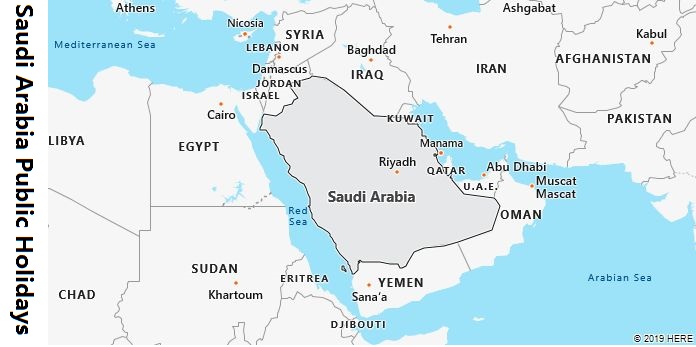Saudi Arabia Holidays
Saudi Arabia Public Holidays
Searching for the national holidays in Saudi Arabia? All public holidays in Saudi Arabia are treated like Sundays. This means that most of the Saudi Arabia employees have a day off and all schools are closed on these office holidays. If you are planning a trip to Saudi Arabia and want to know what the national and regional holidays are, check the details in the tables below.
List of Official Holidays in Saudi Arabia for Year 2020
| # | Date | Holiday | Day |
| 1 | May 24, 2020 | Eid Al Fitr | Sunday |
| 2 | May 25, 2020 | Eid Al Fitr Holiday | Monday |
| 3 | May 26, 2020 | Eid Al Fitr Holiday | Tuesday |
| 4 | May 27, 2020 | Eid Al Fitr Holiday | Wednesday |
| 5 | May 28, 2020 | Eid Al Fitr Holiday | Thursday |
| 6 | July 26, 2020 | Eid Al Adha | Sunday |
| 7 | July 27, 2020 | Eid Al Adha | Monday |
| 8 | July 28, 2020 | Eid Al Adha | Tuesday |
| 9 | July 29, 2020 | Eid Al Adha | Wednesday |
| 10 | July 30, 2020 | Eid Al Adha | Thursday |
| 11 | July 31, 2020 | Eid Al Adha | Friday |
| 12 | August 01, 2020 | Eid Al Adha | Saturday |
| 13 | August 02, 2020 | Eid Al Adha | Sunday |
| 14 | August 03, 2020 | Eid Al Adha | Monday |
| 15 | August 04, 2020 | Eid Al Adha | Tuesday |
| 16 | August 05, 2020 | Eid Al Adha | Wednesday |
| 17 | September 23, 2020 | National Day | Wednesday |
List of Official Holidays in Saudi Arabia for Year 2021
| # | Date | Holiday | Day |
| 1 | May 11, 2021 | Eid Al Fitr Holiday | Tuesday |
| 2 | May 12, 2021 | Eid Al Fitr Holiday | Wednesday |
| 3 | May 13, 2021 | Eid Al Fitr | Thursday |
| 4 | May 14, 2021 | Eid Al Fitr Holiday | Friday |
| 5 | May 15, 2021 | Eid Al Fitr Holiday | Saturday |
| 6 | May 16, 2021 | Eid Al Fitr Holiday | Sunday |
| 7 | May 17, 2021 | Eid Al Fitr Holiday | Monday |
| 8 | May 18, 2021 | Eid Al Fitr Holiday | Tuesday |
| 9 | May 19, 2021 | Eid Al Fitr Holiday | Wednesday |
| 10 | July 18, 2021 | Eid Al Adha | Sunday |
| 11 | July 19, 2021 | Eid Al Adha | Monday |
| 12 | July 20, 2021 | Eid Al Adha | Tuesday |
| 13 | July 20, 2021 | Eid Al Adha | Tuesday |
| 14 | July 21, 2021 | Eid Al Adha | Wednesday |
| 15 | July 22, 2021 | Eid Al Adha | Thursday |
| 16 | July 23, 2021 | Eid Al Adha | Friday |
| 17 | July 24, 2021 | Eid Al Adha | Saturday |
| 18 | September 23, 2021 | National Day | Thursday |















































